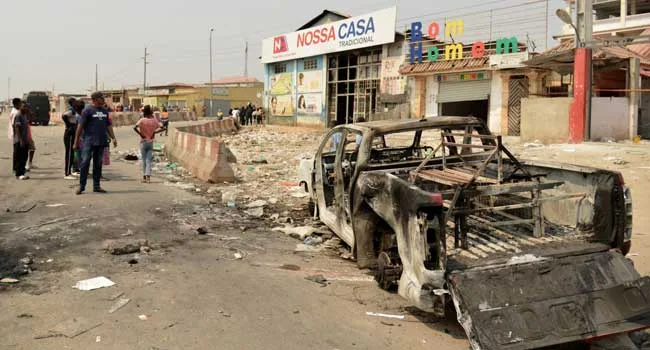At least 22 people, including a police officer, have died following two days of violent unrest and looting in Angola sparked by protests over a fuel price hike, the government said Wednesday.
The violence erupted on Monday after taxi drivers launched a strike against the government’s July 1 decision to increase fuel prices from 300 to 400 kwanzas ($0.33 to $0.43) per litre. The protests quickly escalated, leading to some of the worst unrest seen in Angola in recent years.
Interior Minister Manuel Homem, speaking after a Council of Ministers meeting chaired by President João Lourenço, said nearly 200 people were injured and over 1,200 arrested. At least 66 shops were looted or damaged in the capital, Luanda, and other cities.
Gunfire rang out sporadically across several urban centres, with widespread looting of supermarkets and warehouses. AFP reporters described Luanda as tense but calm on Wednesday, with a strong security presence, closed shops, and long queues at petrol stations.
In the southern city of Lubango, police confirmed a 16-year-old was shot dead on Tuesday during an attempt to storm the ruling MPLA party’s local headquarters.
The unrest was condemned by the government, which blamed “elements with criminal intentions” for turning a peaceful demonstration into a threat to national security. A post-meeting statement by the Council of Ministers said the situation had “triggered a climate of widespread insecurity.”
The three-day strike is the latest in a series of demonstrations this month protesting the fuel price hike and broader economic hardship. At a Saturday protest of roughly 2,000 people in Luanda, demonstrators not only condemned the fuel hike but also criticized government corruption and President Lourenço’s leadership.
Opposition parties, including UNITA and Bloco Democrático, released a joint statement blaming the government for the “severe economic and social crisis,” accusing it of adopting policies “disconnected from the country’s reality.”
With inflation hovering near 20% and unemployment at around 30%, nearly 36% of Angola’s 36 million people live in poverty. The World Bank warns that without stronger social protections and development spending, poverty is likely to persist.
Rights groups, including Amnesty International, have repeatedly accused Angolan authorities of using excessive force to quash dissent. In 2021, at least 10 people were reportedly killed when police opened fire on anti-poverty demonstrators in the diamond mining town of Cafunfo.
AFP


